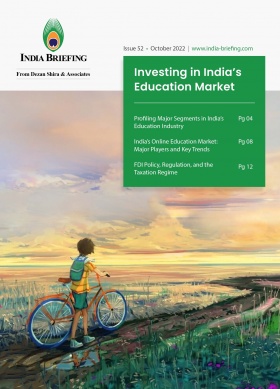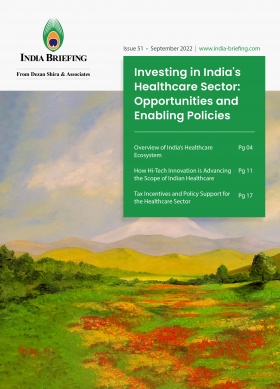Rajasthan Investment Outlook: Location Advantages, Major Sectors, Support for Businesses
In this article, we profile the state of Rajasthan in northwest India and some of the factors that make it appealing for greenfield and brownfield foreign investment – locational advantages, resources, logistics, and emerging and mature industrial sectors. The state offers advanced support infrastructure for businesses and enabling policies to cultivate a competitive investment environment.
Location advantage
Located in the northwest, Rajasthan is the largest state in India by area – 342,239 sq.km. (10 percent of India’s land area) and shares borders with five other states – Punjab, Haryana, Uttar Pradesh, Madhya Pradesh, and Gujarat. These states are among India’s leading agricultural, industrial, logistics, and education hubs. In fact, Rajasthan provides access to about 40 percent of India’s market and is part of key infrastructure linkages between the north and western parts – connecting the hinterland states to the western coastline. Rajasthan also includes territories that form over 25 percent of the National Capital Region (NCR). In terms of logistics, Rajasthan has the third largest highway network, second largest rail network, nine inland container depots (ICDs), seven airports offering international and domestic flights, and one air cargo complex.
Source of maps: Invest Rajasthan, Government of Rajasthan
Resource profile
Rajasthan is a resource rich state, with a strong agrarian base and raw materials for extractive industry. The state’s service sector is also prominent, making up for 45 percent of the gross value added (GVA) (at current prices) in FY2021. The agriculture sector contributes 30 percent to the state’s GVA.
Agri-economy
Rajasthan ranks top among India’s producers of oilseeds, rapeseed, and mustard. It is the second largest producer of garlic, nutri-coarse cereal, coriander, and cumin. The state is also the second largest onshore producer of milk in India.
Rajasthan hosts 956 food processing units and offers business opportunities for contract farming, organic farming, agritech, and support infrastructure. There are four agro-food parks and 10 agro-climactic zones across the state. Some prominent companies include Cargill, VB, DeVans, Bikaji, etc.
Industrial economy
Rajasthan is a leading mineral base in India, producing the second largest amount of minerals in the country and with 82 major and minor mineral deposits found here. Among these, there are 20 mineral parks/zones for granite, sandstone, marble, and ferrous minerals. Granite parks are in 10 districts, sandstone parks are in five districts, and marble parks are in five districts. Rajasthan is the only Indian state producing zinc, lead, selenite, and wollastonite, and is the largest producer of marble in the country. The state is also a leading producer of silver, copper, phosphorite, and gypsum. Leading companies in the sector include Hindustan Zinc, UltraTech Cement, Ambuja Cement, RK Marble, etc.
The state is also a leading renewable energy producer – Rajasthan has the highest installed solar generation capacity at over 16.5 gigawatt (GW) and is among the top five Indian states for installed wind generation capacity. The fully operational 2.245 GW Solar Park at Bhadla is the world’s largest and is spread across 14,085 acres in Jodhpur.
In petrochemicals, Rajasthan is the largest producer of onshore crude oil in India. There are nine MMTPA refinery and petrochemical complexes under the Hindustan Petroleum Corporation (HPCL) Rajasthan Refinery Ltd. This has led to the development of an industrial investment zone around the refinery and petrochemical complex. (MMTPA stands for million metric tons per annum.)
In textiles, Rajasthan is India’s largest producer of blended fabric and wool. Major apparel and textile hubs in the state are Bhilwara, Pali, Balotra, and Jaipur. All segments of the textile and apparel industry can be found here – from spinning to finished garment manufacturing, made-ups, and textile handicrafts. Prominent firms include ginni, SUtleJ, Ranswara, etc.
In the automotive sector, Rajasthan hosts more than 100 automotive and auto component manufacturing units. Key hubs in this sector are Bhiwadi, Neemrana, Pathredi, and Alwar city. Prominent companies include Honda, Hero, TAFE, ASHOK LEYLAND, and JCB.
In the electronics system design and manufacturing (ESDM) sector, Bhiwadi is being developed as a key hub. It is located 60 km from the Indira Gandhi International Airport at New Delhi. Bhiwadi is already a key producer of silver, copper, and silica – which are key inputs for ESDM products. In fact, a brownfield electronics manufacturing cluster (EMC) is coming up at Jaipur-Bhiwadi-Neemrana-Udaipur-Ajmer-Kota. Two other government-approved EMCs are located at Salarpur and Karoli Industrial Areas. Some prominent firms are RMC, SECURE, REIL, etc.
Service economy
Tourism
The state has a huge tourism economy – Rajasthan attracted 22 million tourists in 2021, amid the pandemic. Rajasthan boasts of a diverse natural geography (desert, lakes, and hills) and historical architecture, and its tourism products include wildlife sanctuaries, village tourism, adventure parks, luxury train tours, forts, as well as cultural performances, festivals, and fairs.
There are six UNESCO World Heritage Monuments in the state.
Leading tourist sites in Rajasthan include Jaipur (the Pink City), Udaipur (known for its lakes and lake palaces), Jodhpur, Jaisalmer, Mount Abu (hill station), Dausa (historical town), Tonk (renowned for old havelis and mosques), Pushkar (town of fairs and festivities), Sawai Madhopur (gateway to Ranthambore, known for its wildlife national park), among several others.
IT and IT-enabled service (ITeS)
The state has four IT Parks at Jodhpur, Kota, Jaipur, and Udaipur. In the works is an integrated FinTech Park, which will be spread across 37 hectares in Jaipur and located 2 kms from the Jodhpur International Airport.
Mahindra World City SEZ
Mahindra World City (MWCJ), which is the largest special economic zone (SEZ) in north India, is set up at Jaipur.
More than 80 global and domestic companies, including companies like JCB, Perto, Ball Corporation, Mahindra & Mahindra, Infosys, Metlife, Deutsche Bank, ICICI Bank, Genpact, Infosys, Nucleus Software, Gravita India, Wipro, Yasen Lighting, Fackelmann, KnitPro International, Ratan Textiles and Bharatiya Skill Development University, etc. are set up at this SEZ.
The MWCJ SEZ is a 74:26 joint venture between Mahindra Lifespace Developers Ltd. and the Rajasthan State Industrial Development and Investment Corporation Ltd (RIICO), an agency of the Government of Rajasthan.
Spread over an area of 3,000 acres, MWCJ consists of a Multi-Product Special Economic Zone (SEZ), a Domestic Tariff Area (DTA), and social and residential infrastructure zones. The facilities at the SEZ include plug ‘n’ play infrastructure, built-to-suit-solutions, dedicated power substations, assured water supply with dedicated lines for fresh water and recycled water, on-site customs office, fire station, post office, 33 percent green spaces, wide roads for easy container mobility, etc.
In terms of locational factors favoring the Mahindra World City, Jaipur SEZ, the below may be noted:
- Road connectivity – Inland Container Depot: 15 Km; Bus Rapid Transport System (BRTS) operational
- Air connectivity – Jaipur International Airport and Cargo Complex: 22 km; Airlinks to major Indian cities and key international destinations
- Rail connectivity – Jaipur Railway Station: 21 km; Rail Inland Container Depot: 14 km; Metro Phase – I operational in Jaipur
- Port connectivity – Kandla Port – 809 km; Mundra Port – 850 km; Dahej Cargo Port – 877 km; Hazira Port – 895 km; JNPT – 1173 km
Human capital
Rajasthan is home to close to 70 million people and has a large skilled manpower base. Several premier higher education, engineering, and training institutions are based here that provide human resource capital to multinational companies recruiting throughout the country. These include BITS, Pilani; NIFT, Jodhpur; National Law University, Jodhpur; IIT, Jodhpur; IIM, Udaipur; AIIMS, Jodhpur; MNIT, Jaipur; and Footwear Design & Development Institute, Jodhpur.
Besides, the state has the largest number of universities – 83 and two dedicated skill universities. Around one-third of India’s chartered accountants and cost accountants are from Rajasthan. There are about 1,909 industrial training institutes (ITI), 152 polytechnic institutes, and 237 engineering and technology colleges in the state.
Leading companies
Some leading companies with a presence in Rajasthan include Hero, Honda, JCB, Ashok Leyland, Cairn, Lafarge Cement, Cargill, Saint-Gobain, Bosch, nbc, Roca, Tafe, Daikin, ITC, KEI, Havells, Perto, PITTIE, Ambuja Cement, and Jaguar.
Enabling policies for business
Rajasthan Investment Promotion Scheme (RIPS) 2019
The Rajasthan Investment Promotion Scheme (RIPS) 2019 (see official document here) is the state’s flagship scheme, which offers an attractive package of financial incentives for several sectors. These include investment subsidy, employment generation subsidy, and a range of exemptions from electricity duty, land tax, stamp duty, etc., which apply to eligible enterprises.
Thrust sectors for incentives
Under the flagship investment promotion scheme, Rajasthan has identified certain thrust sectors, where eligible enterprises can tap into subsidies on investment, employment generation, capital expenditure, and interest.
In the manufacturing sector, thrust sectors include agro-processing, biotechnology, ceramic and glass, dairy, defense, electric vehicles, food processing, auto component, ESDM, chemical, petrochemical and petro ancillary, pharmaceutical, leather, footwear and accessories, gems and jewelry, minerals, handicrafts, medical device manufacturing, MSMEs, solar equipment manufacturing, startups, textile and apparel, wind turbine manufacturing, among others. In the services sector, the thrust sectors include cold chain in pharmaceuticals, common utility center, industrial parks, infrastructure for value addition or preservation of agricultural products, IT parks, IT sector, logistics infrastructure, testing laboratories. There are benefits available for enterprises in recognized backward and most backward areas.
|
General Provisions Applicable Across Boards |
||
|
General incentives to all manufacturing and services enterprises |
Particulars |
Incentives |
|
Investment subsidy |
– 75% state tax due and deposited for 7 years |
|
|
Employment generation subsidy |
– 50% of employer’s contribution towards employees EPF and ESI, for 7 years – 75% of employer’s contribution towards employees EPF and ESI, for 7 years for women/SC/ST/PwD entrepreneurs – 75% of employer’s contribution towards employees EPF and ESI, for 7 years to enterprises providing more than 75% direct employment to persons domiciled in Rajasthan |
|
|
Market fee exemption |
100% of market fee for 7 years |
|
|
Stamp duty exemption |
100% exemption |
|
|
Electric duty exemption |
100% for 7 years |
|
|
Exemption from conversion charges for change of land use |
100% |
|
|
Land tax exemption |
100% for 7 years |
|
Customized incentives package
The state government can also grant customized package of incentives under section 11 of the Rajasthan Enterprises Single Window Enabling and Clearance Act, 2011 to enterprises (other than cement manufacturing) that meet certain criteria such as investment threshold (of more than INR 1 billion / US$12.08 million) and employing more than 200 persons. (US$1=INR 82.78.)
Sector specific policies
There are sector specific policies as well for investment in Solar, Wind & Hybrid, Tourism, agro-processing and MSMEs.
MSME Act
The state facilitates the easy set up and operation of MSMEs under The Rajasthan MSME Act, 2019:
- Allowing entrepreneurs to start their businesses after filling a self-declaration form
- Exempting MSME enterprises from inspections by various departments for a period of 3 years and offering a 6-month corrective period
- Provision of well-defined land allotment processes
- Requisite business clearances granted online in clearly defined timelines
- Stable law, order, and labor relations
About Us
India Briefing is produced by Dezan Shira & Associates. The firm assists foreign investors throughout Asia from offices across the world, including in Delhi and Mumbai. Readers may write to india@dezshira.com for more support on doing business in in India.
We also maintain offices or have alliance partners assisting foreign investors in Indonesia, Singapore, Vietnam, Philippines, Malaysia, Thailand, Italy, Germany, and the United States, in addition to practices in Bangladesh and Russia.
- Previous Article MCA Extends Some Reporting Compliance Deadlines to March 31: V3.0 Portal Migration
- Next Article India’s GDP for FY 2022-23 Projected at 7%: Second Advance Estimates












